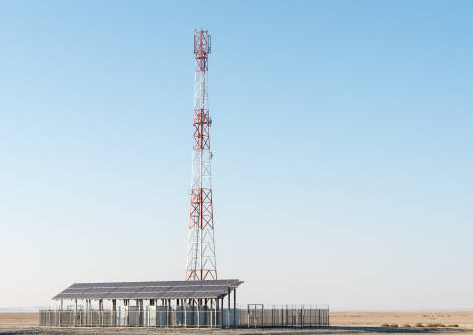Enhancing BESS Performance: The Application and Advantages of Liquid Cooling Technology in Battery Energy Storage Systems
In recent years, the push towards sustainability has permeated every industry, including telecommunication. As the world becomes more interconnected and reliant on telecommunications for daily activities, the need for a reliable and eco-friendly energy source is more pressing than ever. Solar energy in telecommunication has emerged as a powerful solution to meet these needs while reducing environmental impact. This article explores the benefits, applications, and future potential of integrating solar energy into telecommunication systems.
The Growing Need for Sustainable Telecommunication Solutions
Telecommunication networks are the backbone of modern communication, supporting everything from phone calls and text messages to internet browsing and streaming services. As demand for these services grows, so does the energy consumption required to power the infrastructure. Traditionally, this energy has come from non-renewable sources, contributing to environmental degradation and climate change.
The shift towards sustainable practices has led many telecommunication companies to explore alternative energy sources, with solar energy being one of the most promising. By harnessing solar power, telecom companies can reduce their reliance on fossil fuels, lower operational costs, and contribute to a greener planet.
Benefits of Solar Energy in Telecommunication
Environmental Impact
One of the most significant benefits of solar energy in telecommunication is its positive environmental impact. Solar power is a clean, renewable source of energy that doesn’t produce greenhouse gases or other pollutants. By integrating solar panels into telecom infrastructure, companies can significantly reduce their carbon footprint and support global efforts to combat climate change.
Cost Savings
While the initial investment in solar technology can be substantial, the long-term cost savings are considerable. Solar energy systems reduce or eliminate electricity bills, leading to lower operational costs over time. Additionally, solar panels have low maintenance costs, which further contributes to financial savings. For telecommunication companies, this can mean substantial savings, especially in remote or off-grid locations where conventional power sources are expensive to maintain.
Reliability and Energy Security
Telecommunication networks require a reliable and continuous power supply. Solar energy can enhance energy security by providing a stable power source, even in areas with unreliable grid connections. Solar panels, combined with energy storage solutions, can ensure that telecom infrastructure remains operational during power outages or grid failures.
Scalability and Flexibility
Solar energy systems are highly scalable and flexible, making them suitable for a wide range of telecommunication applications. Whether it’s powering remote cell towers, data centers, or local exchange points, solar technology can be adapted to meet various energy needs. This scalability allows telecom companies to deploy solar energy solutions in diverse environments, from urban centers to remote rural areas.
Applications of Solar Energy in Telecommunication
Remote Cell Towers
Cell towers are essential for mobile communication, but they are often located in remote or underserved areas where conventional power sources are limited or non-existent. Solar energy provides an ideal solution for powering these remote cell towers, ensuring consistent service in even the most challenging locations. By installing solar panels on or near cell towers, telecom companies can maintain connectivity without relying on diesel generators or expensive grid connections.
Data Centers
Data centers are the heart of telecom networks, housing servers and infrastructure critical for data processing and storage. They require a significant amount of electricity to operate and cool the equipment. Integrating solar energy into data centers can help offset electricity consumption, reduce operational costs, and improve overall energy efficiency. Solar panels can be installed on the rooftops or within the facility to generate power for both operational needs and cooling systems.
Base Stations and Network Nodes
Base stations and network nodes play a crucial role in managing and routing communication traffic. By incorporating solar energy into these components, telecom companies can enhance the reliability of their networks while reducing operational costs. Solar panels can provide supplementary power, supporting base stations and network nodes in both urban and rural settings.
Emergency Communication Systems
During emergencies or natural disasters, maintaining communication is critical. Solar energy can support emergency communication systems by providing a reliable power source when traditional power infrastructure is compromised. Solar-powered emergency communication stations can ensure that first responders and affected communities remain connected, even when grid power is unavailable.
Future Potential and Trends
The future of solar energy in telecom looks promising, with several trends and developments on the horizon:
Advancements in Solar Technology
Technological advancements are continually improving the efficiency and affordability of solar panels. Innovations such as higher-efficiency photovoltaic cells, bifacial panels, and advanced energy storage solutions are making solar energy more viable for telecom applications. As these technologies advance, the integration of solar energy into telecommunication systems will become even more practical and cost-effective.
Integration with Smart Grids
The integration of solar energy with smart grid technologies is another exciting development. Smart grids use digital communication and automation to manage energy distribution more effectively. Combining solar energy with smart grid systems can optimize energy use, improve grid reliability, and enhance overall network performance. For telecommunication companies, this integration can lead to more efficient and resilient energy management.
Expansion of Solar Projects
As the benefits of solar energy become more widely recognized, the expansion of solar projects within the telecommunication sector is likely to increase. Telecom companies are expected to invest more in solar technology, deploying solar panels in new and existing infrastructure. This expansion will not only contribute to sustainability goals but also support the growing demand for reliable and affordable communication services.
Policy and Incentives
Government policies and incentives can play a significant role in promoting the adoption of solar energy in telecommunication. Supportive regulations, tax credits, and subsidies can reduce the financial barriers associated with solar investments, encouraging more telecom companies to explore and implement solar solutions.
Challenges and Considerations
While the integration of solar energy offers numerous benefits, there are also challenges to address:
Initial Costs
The initial costs of installing solar panels and related infrastructure can be high. However, these costs are often offset by long-term savings on electricity and maintenance. Telecom companies must carefully evaluate the return on investment and plan for the upfront expenses.
Space and Installation
The installation of solar panels requires adequate space and proper positioning to maximize energy generation. Telecom companies need to assess the feasibility of solar installations on their existing infrastructure and ensure that they have sufficient space and suitable conditions for optimal performance.
Energy Storage
To fully capitalize on solar energy, effective energy storage solutions are necessary. Integrating battery storage with solar panels can help manage energy supply and ensure availability during periods of low sunlight. Telecom companies must consider the costs and logistics of implementing and maintaining energy storage systems.
Conclusion
Solar energy in telecommunication represents a transformative opportunity for the industry. By integrating solar power into their operations, telecom companies can reduce their environmental impact, cut costs, and enhance energy reliability. As technology advances and solar solutions become more accessible, the adoption of solar energy in telecommunication is expected to grow, supporting a more sustainable and resilient communication infrastructure.
Embracing solar energy is not just a step towards greener operations but also a strategic move that aligns with the increasing demand for sustainable and reliable telecom services. As the industry continues to evolve, solar energy will play a crucial role in shaping the future of telecommunication, making it a key element in the pursuit of a more sustainable and connected world.
Contact us
- Email:[email protected]
- Tel: +86 13651638099
- Address: 333 Fengcun Road, Fengxian District, Shanghai
Get A Quote Now!
Related product links are available directly
Site storage products:Site storage products 归档 – (energystoragecontainer.com)
Lithium Battery:Lithium Battery 归档 – (energystoragecontainer.com)
Read more

Five Advantages of Residential Solar Power: Why Choose Photovoltaic Energy?
As global energy demands continue to rise and environmental issues become more urgent, more and more households are turning to solar power systems. Residential solar photovoltaic (PV) power generation not only helps save energy and reduce carbon emissions but also provides numerous practical benefits in daily life.

Comparison of Functions and Applications Between Home Energy Storage Systems and Outdoor Mobile Power Sources
As our world becomes increasingly reliant on energy-efficient solutions, two popular products have emerged to meet different power needs: the home energy storage system and the outdoor mobile power supply (or portable power station).

From Sun to Socket: An Analysis of the Whole Process of Home Solar Power Generation
Solar energy is no longer just a futuristic concept; it’s here and it’s powering homes across the globe. But have you ever wondered how that sunlight streaming onto your roof gets turned into electricity to charge your devices?

Nighttime Solar Energy: How to Use Energy Storage to Achieve a 24-Hour Power Supply
For many homeowners, the dream of achieving a reliable household solar energy system that can provide power around the clock is becoming a reality. With advances in energy storage devices, especially lithium batteries, even a dark night doesn’t have to mean an interruption in power.

